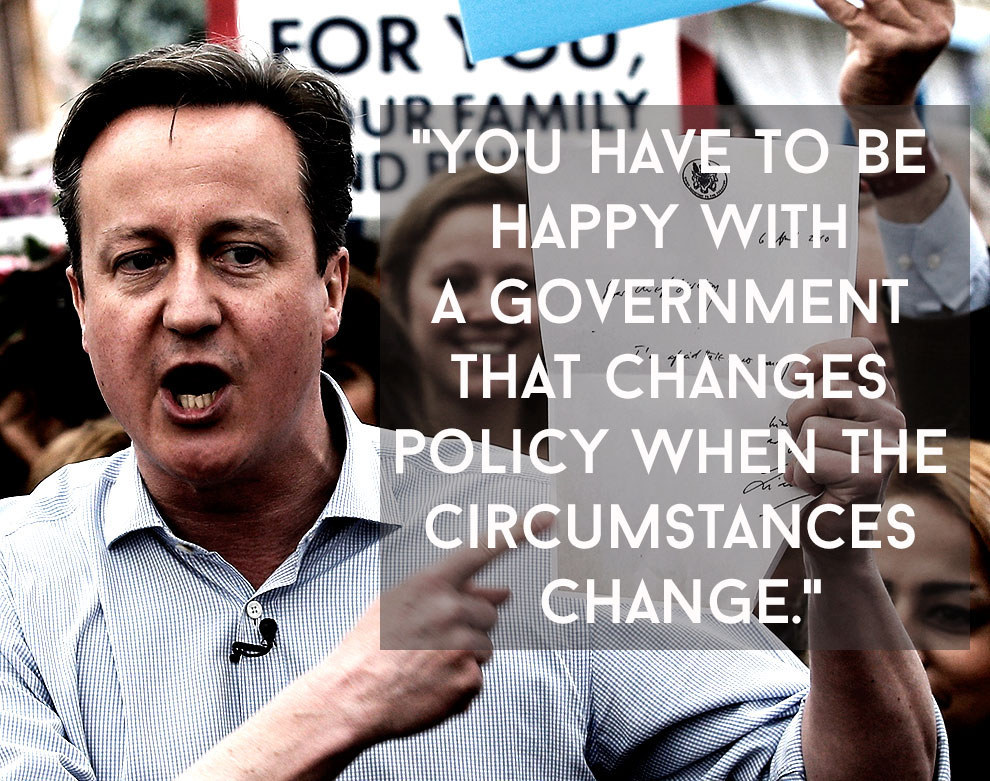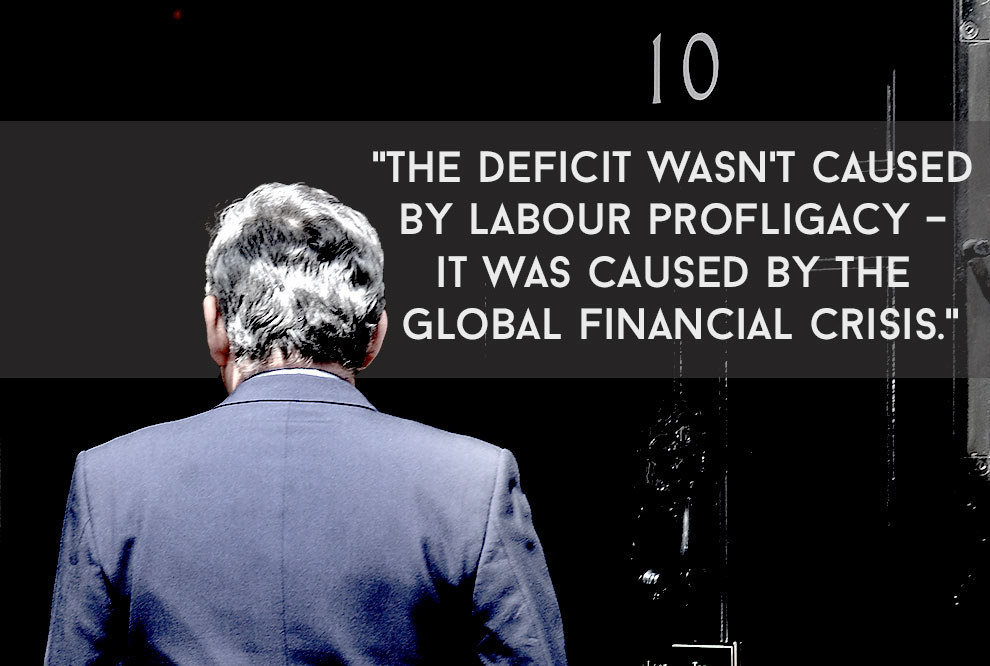
Prof Simon Wren-Lewis, University of Oxford
"The media have put forward a simple economic narrative. The previous Labour government spent too much, and the mess they made almost drove the country to financial ruin. The coalition came in, and after some tough years repairing the damage caused by Labour, we are now reaping the reward.
"But this is almost entirely untrue. The budget deficit suffered by the last government was caused by the recession, which itself was caused by the global financial crisis – not by government overspending. There was no threat of another crisis in 2010, when the coalition took over, so there was no urgent need for financial austerity. The cuts could have been left until after the economy began to recover and interest rates had risen. The coalition's decision to cut spending delayed the recovery by three years.
"Even now growth rates are simply back to normal; we are not catching back up to where we ought to be. Living standards are failing to improve and productivity has remained stagnant. The government is trumpeting its own economic performance, but in reality it has held the economy back."

Prof Tony Yates, University of Birmingham
"I'm not as down on the coalition as some, when it comes to their policies on austerity and the deficit. I think the initial push towards austerity was warranted, given that people were worried about a second banking crisis because of the difficulties that the eurozone was in.
"But the austerity policies shouldn't have been imposed come what may. Once the fear of a second crisis had passed, the priority should have switched to helping out monetary policy, to avoid us getting stuck with interest rates at zero (as has actually happened) and deflation (which we've just about avoided, so far). Once it was clear we were safe, austerity and deficit reduction should have stalled.
"In fact, the coalition did ease off austerity, but it greatly reduced the benefits it could have gained by refusing to admit that it had, and by claiming it was sticking to 'plan A'. That meant that the usual confidence boost you get from looser fiscal policy was lost. In future, if the recovery continues so that interest rates can be lifted to more normal levels, it would be a good idea to work to reduce the debt, so that if there's another downturn in future we can run it up again without worrying too much.
"There are some other pluses and minuses. Setting up the Office for Budget Responsibility was a bold and great move. Facilitating the Financial Policy Committee and macroprudential policy was a good idea and will hopefully help. However, the Help to Buy scheme was a carbuncle, shoving up the prices of the limited supply of housing, and acting as a transfer from the state to older people who already benefited a lot from the post-crisis house price rise."

Prof Amrita Dhillon, King's College London
"In 2010, the government started off with spending cuts and an increase in VAT, but the pace of deficit reduction slowed down after 2012. This austerity drive was a response to the financial crisis, and the Greek debt crisis. The prevalent opinion was that the Greek crisis would adversely affect the eurozone countries' ability to repay debt, because interest rates would rise.
"But Greece and the UK are very different. Would interest rates on UK debt have risen at the same rates? Probably not, because the market's perception of the two countries is different, and the UK has its own central bank.
"To counteract the damage austerity would do to the economy, the government planned to rely on 'quantitative easing' (QE), a kind of money creation, which would lead to lower interest rates, higher employment and increased demand. But economists believe QE had less of an effect than expected, so austerity had a negative impact.
"The International Monetary Fund and other leading economic organisations have backed the coalition's austerity measures, so it's reasonable for the government to talk up its economic record. It would have been better if they had been honest about the mistakes that they made with the austerity policy, especially as it cut strategic investment in the public sector. But overall, you have to be happy with a government that changes policy when the circumstances change."

Kristian Niemitz, Institute of Economic Affairs
"I'm in the 'austerity hasn't actually happened' camp. Cutting the deficit by a third is rather pathetic when you start from a record peacetime high. It's well-established that recessions last longer when they are preceded, or have been caused, by a financial crisis. It takes longer to restore confidence, and that is a problem which cannot be resolved by higher government spending. In short, the idea that there would be a quick rebound was probably unrealistic right from the start, and blaming the slow recovery on mild austerity is a dubious argument.
"There is some theoretical attraction in the Keynesian idea of running a deficit during recessions, and a surplus in boom times, but politics does not work that way. I'd rather say, whenever there is a window of opportunity for cutting the deficit, politicians should use it. In the medium term, spending will increase again anyway, both because of demographic pressure and because of the 'normal' political pressures. It is absurd to worry about politicians being too reluctant to spend.
"None of this is to say that the coalition has done a good job, or even a satisfactory job. The fiscal consolidation debate has been far too focused on the 'how much' rather than the 'how'. It is far more important how you cut spending, because there are smart ways and not-so-smart ways of doing it. It is like at the individual level: If you find that your heating expenses are too high, you can either turn down the heating, sit in the cold, and be miserable (not so smart). Or you can move to a smaller place, which doesn't cost much to heat (smarter). When your transport costs are too high, you can cut back on your mobility (not so smart), or you can move closer to the relevant facilities (smarter).
"The same applies to government spending. Take housing benefit, which costs about £25 billion per year. You can try to decouple it from rising rents, in which case people who run into arrears would have to rely on food banks (not so smart). Alternatively, you could just allow the construction of more houses, which would drive down rents, and thus housing benefit (smart).
"Almost all of the spending reduction decisions (tax credits, NHS reorganisation, the 'triple-lock' state pension, old-age benefits) were of the not-so-smart variety; the coalition never did much to explore why, in a lot of areas, there was a reliance on such very high spending levels."

Prof John Van Reenen, London School of Economics
"Here's the story that's accepted by most academic economists, I think. In 2010 Britain was running a relatively high deficit, about 10% of GDP. That wasn't caused by Labour profligacy, it was caused by the global financial crisis.
"The previous government was already trying to cut the deficit, but the coalition accelerated this. The first two years of the coalition saw very tough deficit reduction measures – what came to be known as George Osborne's Plan A, to remove the deficit altogether by March 2015, against the standard economic advice.
"It didn't happen. The severe cuts reduced demand in the economy and what happened next was exactly what was expected: The economy tanked. In 2013 and 2014, austerity was slowed, in what we could call Plan B. The deficit still stands at about 5% of GDP. In the years since then, the economy has grown a bit better. It's really a game of two halves.
"The question is whether it's helped. The current economic situation is pretty bad, in terms of GPD per head and productivity. It's the worst recovery for 100 years, or more. Draw a straight line from the 1950s, and since 2008–2009 GDP per head is about 17% below what you'd expect.
"It's worth asking much of this would have happened anyway. The Office for Budget Responsibility estimates that the coalition's deficit reduction measures have reduced the economy by about 2%, so about 1% for each year of full austerity. I'd say that's probably an underestimate, and the International Monetary Fund agrees: Cuts do more damage in recessions than in normal times, because normally the Bank of England could do things like cut interest rates. Interest rates have been at zero since the crisis, so fiscal policy – spending – is more important than ever."

Prof Shaun Hargreaves Heap, King's College London
"When the coalition announced its austerity programme in 2010, it declared that it was essential on the grounds of a specious analogy with Greece and the other eurozone countries which, at the time, were suffering deficit problems. But that analogy didn't hold: Unlike members of the eurozone, the UK controls its own money supply, and so it was never in the same danger as Greece.
"As economists warned at the time, the result was that the UK economy, which had been recovering, fell back into recession. So austerity was quietly relaxed, despite claims to the contrary – not entirely, but certainly relative to the dramatic cuts which had been planned in 2010 – and the economy started growing again."

